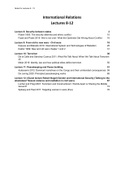College aantekeningen
Core Module International Relations Second Year (IR) - Complete summary (Quiz 2)
This document provides a complete summary lectures 8-12 of the core module International relations. It includes all readings and lecture content for the second IR quiz.
[Meer zien]




